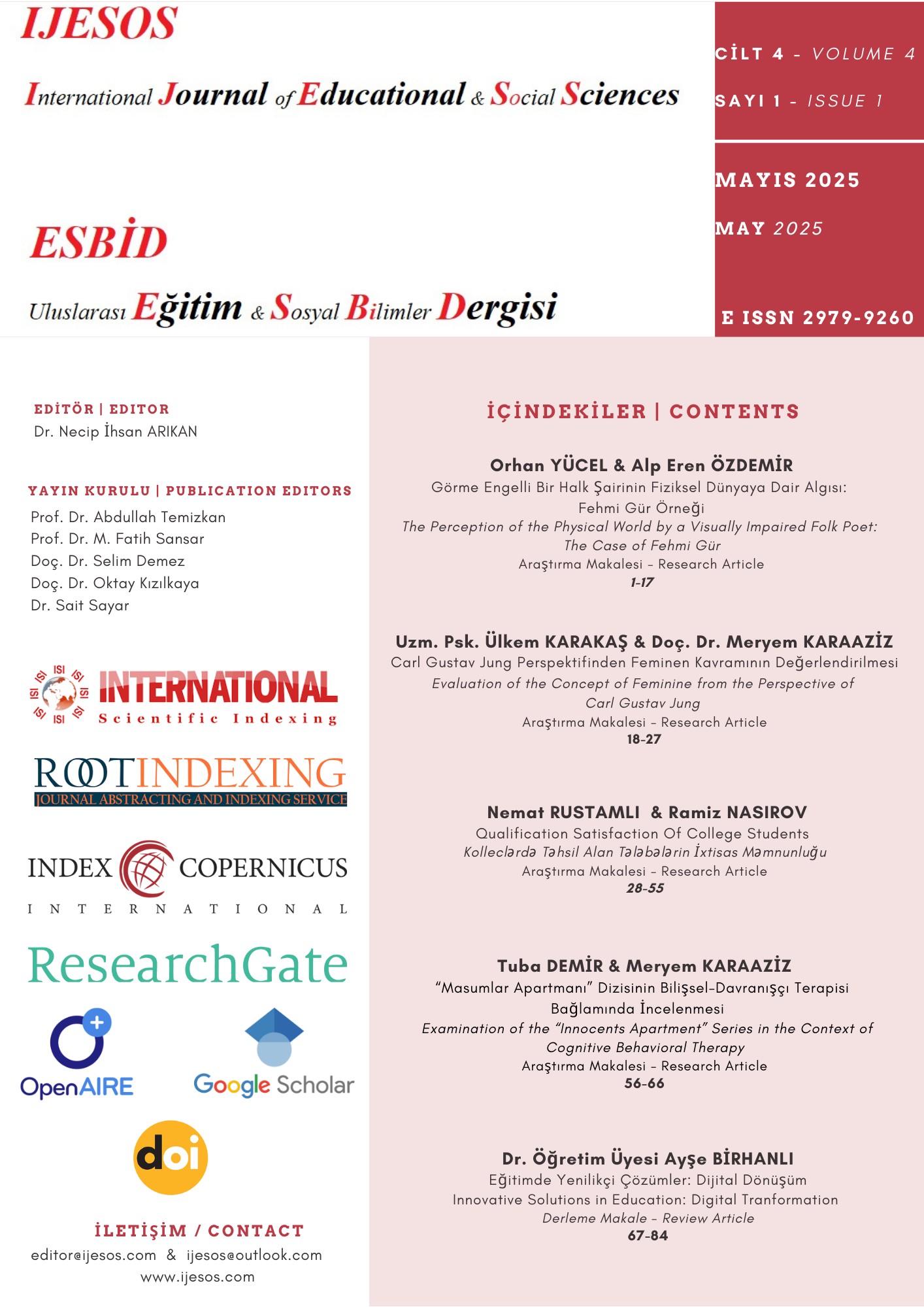Qualification Satisfaction Of College Students
DOI:
https://doi.org/10.5281/zenodo.15448641Keywords:
collage education, specialty satisfaction, motivation, careerAbstract
This study examines the quality of student recognition skills in colleges in different regions of Azerbaijan. Research studies; The quality of material and technical education was evaluated in terms of material and technical foundation, social and psychological support services. The research based on quantitative methodology was conducted with the help of 2946 students and the obtained data was analyzed in the SPSS program. The question depends on the environment, teachers, curriculum and labor market availability. In this context, the choice of department is closely related to a number of interests: personal, demand for various professions, family and social influences, as well as the quality of education provided at the university. Greater satisfaction also increases the likelihood of higher academic performance. Research results showed that the majority of students believed that the education they received would have a positive impact on their future career prospects and quality of life. At the same time, ambivalent and negative opinions emphasized the need to increase the practical components of educational programs, expand extracurricular activities and develop social-psychological support services. The results obtained may be useful in developing strategic development plans of universities and strengthening student-centered teaching approaches.
References
Aydemir, E. (2016). Ögrenci Memnuniyeti açısından üniversiteler arası sıralamada yeni bir sistem önerisi. Yüksek ögretim Dergisi, 6(3), 128–141. https://dx.doi.org/10.2399/yod.16.011
Aydın, S., Görmüş, A. Ş., & Altıntop, M. Y. (2014). Öğrencilerin memnuniyet düzeyleri ile demografik özellikleri arasındaki ilişkinin doğrusal olmayan kanonik korelasyon analizi ile incelenmesi: Meslek yüksekokulunda bir uygulama. AİBÜ Sosyal Bilimler Enstitüsü Dergisi, 14(1), 14–35. https://doi.org/10.11616/AbantSbe.475
Azərbaycan Respublikasının Dövlət Statistika Komitəsi, (ARDSK, 2024). Orta ixtisas təhsili müəssisələri https://www.stat.gov.az/source/education/#
Bailey, T., & Xu, D. (2012). Input-adjusted graduation rates and college accountability: What is known from twenty years of research? Journal of Higher Education, 83(4), 485-502. https://doi.org/10.1353/jhe.2012.0029
Billett, S. (2014). The standing of vocational education: Sources of its societal esteem and implications for its enactment. Journal of Vocational Education & Training, 66(1), 1-21. https://doi.org/10.1080/13636820.2014.894638
Bilgin, A., Özdemir, L., Şahan, F. U., Dönmez, A. A., & Kapucu, S. (2022). Öğrencilerin öğrenme çıktılarından memnuniyeti anketinin Türkçe geçerlik ve güvenirlik çalışması. Hacettepe Üniversitesi Hemşirelik Fakültesi Dergisi. https://doi.org/10.31125/hunhemsire.1167269
Carnevale, A. P., Smith, N., & Strohl, J. (2012). Recovery: Job growth and education requirements through 2020. Georgetown University Center on Education and the Workforce.
Chen, X., Liu, H., & Zha, Q. (2020). Employment outcomes of vocational education graduates in China: A case study. International Journal of Educational Development, 77, 102-137. https://doi.org/10.1016/j.ijedudev.2020.102237
Danışman, B., Sarul, G., Amini, N., Ada, O. O., Aktaş, S. G., Kılıç, S. İ. (2023). METU students’ college life satisfaction. Middle East Technical University Department of Statistics. https://doi.org/10.48550/arXiv.2305.15320
Dhaqane, M. K., & Afrah, N. A. (2016). Satisfaction of students and academic performance. Journal of Education and Practice, 7(24), 59-63. https://doi.org/10.21325/jotags.2020.591
Euler, D. (2013). Germany's dual vocational training system: A model for other countries? Bertelsmann Stiftung
Fike, D. S., & Fike, R. (2008). Predictors of first-year student retention in the community college. Community College Review, 36(2), 68-88. https://doi.org/10.1177/0091552108320222
Horn, L., & Nevill, S. (2006). Profile of undergraduates in U.S. postsecondary education institutions: 2003–04. National Center for Education Statistics
Kim, J. (2018). The role of vocational education in South Korea’s economic development: Past success and future challenges. Asian Education and Development Studies, 7(3), 292-305. https://doi.org/10.1108/AEDS-10-2017-0095
Kim, J., Tamborini, C. R., & Sakamoto, A. (2015). Field of study in college and lifetime earnings in the United States. Sociology of Education, 88(4), 320-339. https://doi.org/10.1177/0038040715602132
Kuwahara, T. (2015). Japanese Kosen model: A successful example of STEM education at the college level. Procedia - Social and Behavioral Sciences, 177, 360-364. https://doi.org/10.1016/j.sbspro.2015.02.355
Qaliboğlu E. (2024). Ali məktəbdə müəllim-tələbə münasibətlərinin elmi-pedaqoji əsasları. Azərbaycan məktəbi. 2(707), səh. 90-96. DOI: 10.30546/32898065.2024.2.090
Lee, M., Lee, H., & Lee, J. (2014). Factors influencing career decision-making of vocational school students in South Korea. International Journal of Vocational Education and Training, 22(2), 35-50.
Milsom, A., Coughlin, J. (2015). Satisfaction With College Major: A Grounded Theory Study, NACADA Journal. 35(2), 5-14. http://dx.doi.org/10.12930/NACADA-14-026
Moore, C., & Shulock, N. (2009). Student progress toward degree completion: Lessons from the research literature. Institute for Higher Education Leadership & Policy
OECD. (2020). VET in a time of crisis: Building foundations for resilient and sustainable skills systems. OECD Publishing. https://doi.org/10.1787/cf6a92a5-en
Özok, H., İ., Kayri, M., Tanhan, F. (2022). Üniversite öğrencilerinde memnuniyet ölçeği: Geçerlik ve güvenirlik çalışması. Van Yüzüncü Yıl Üniversitesi Eğitim Fakültesi Dergisi, 19(2), 446-461. https://doi.org/10.33711/yyuefd.1108292
Pilz, M. (2016). Vocational education and training in Germany: Modernisation and new challenges. Zeitschrift für Erziehungswissenschaft, 19(S2), 281-301. https://doi.org/10.1007/s11618-016-0724-0
Ryan, R. M., & Deci, E. L. (2017). Self-determination theory: Basic psychological needs in motivation, development, and wellness. Guilford Publications
Ryazhkin A.O. (2023). Удовлетворенность учебной деятельностью и совладающее поведение студентов вуза. Психологические исследования. 16(87). 1-19
Sidorova E.V. (2020). Удовлетворенность сткдентов-очников бакалавриата СФУ учебным процессом. Nəşr edilməmiş dissertasiya işi.
Sinclaire, Jollean K. (2014). An Empirical Investigation of Student Satisfaction with College Courses. Research in Higher Education Journal. 22, 53-69
Sop, S. A. (2020). Eğitim-Öğretim Memnuniyeti, Akademik Erteleme Eğilimi ve Akademik Başarı İlişkisi, Journal of Tourism and Gastronomy Studies, 8 (2), 983-996, https://doi.org/10.21325/jotags.2020.591
Tessema, M., Ready, K., & Yu, W. (2012). Factors affecting college students' satisfaction with major curriculum: Evidence from nine years of data. International Journal of Humanities and Social Science, 2(2), 34–44.
Yang, J., Seo, J. (2021). Effects of College Life Satisfaction, Major Satisfaction and Academic Self-efficacy on School Loyalty, Journal of Advanced Researches and Reports Vol.1, No.3 (2021), pp.31-38. http://dx.doi.org/10.21742/jarr.2021.1.3.05
Zborovski Q.E. (2021) Удовлетворенность студентов колледжей и вузов образованием. Образование: вызовы нового времени. 27(4). 177-192
Zhai, Lijuan. (2012). Validation of an Instrument to Measure Community College Student Satisfaction. Community College Journal of Research and Practice. 36. 47 - 58.
Downloads
Published
How to Cite
Issue
Section
License
Copyright (c) 2025 International Journal of Educational and Social Sciences

This work is licensed under a Creative Commons Attribution 4.0 International License.


